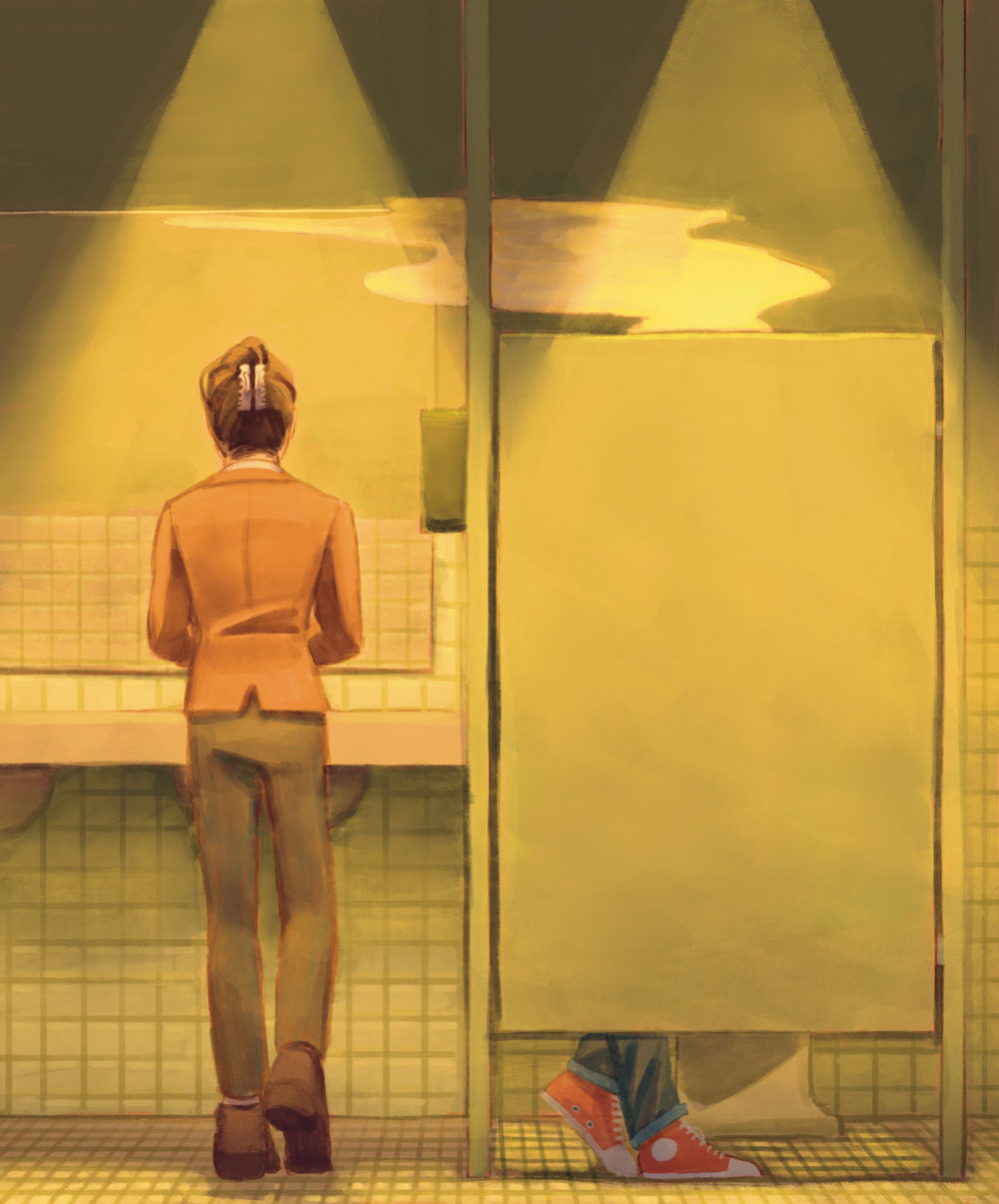A student, who will remain anonymous, seated quietly behind two classmates in English class, remains out of sight. She reaches into her backpack and subtly pulls out a vape pen, letting the mouthpiece hang just outside the bag. This incident was one of several cases involving students using illegal substances on campus, according to students interviewed by The Puma Press.
Usage of nicotine products increased slightly this year at UPrep. Vape usage went up from 3.3% in the fall of 2023 to 4.2% in the fall of 2024, according to Data on substance use among UPrep students comes from the Authentic Connections survey, which the school conducts at the beginning of each year. The data also showed that cigarette consumption rose from 5.5% to 5.9%. Alcohol experimentation increased as well, from 5.2% to 6.2%.
The Authentic Connections survey shows “clinically significant” data about vaping, cigarettes, alcohol, marijuana and more. Clinically significant regards usage six or more times in the last 30 days (20 or more times for males vaping).
Nationally, vaping and nicotine pouches have remained substances that students turn to. Among seniors nationally, with nicotine pouches at 5.9% (2.9% in 2023) and nicotine vaping remained stable at 21% over the last year, according to the National Institutes of Health.
Four students interviewed by the Puma Press under the condition of anonymity described the usage of marijuana, alcohol, nicotine, psychedelics and cocaine among UPrep students. Students interviewed by The Puma Press were given pseudonyms to protect their anonymity.
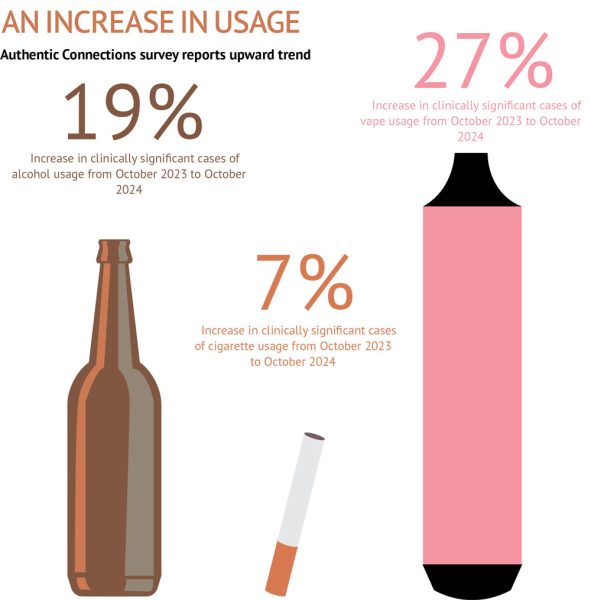 The student culture at UPrep contributes to the normalization of nicotine products, according to George, a junior who uses nicotine and cannabis products. Emily a senior who has used Zyns in school bathrooms and consumed alcohol outside of school, agrees with George.
The student culture at UPrep contributes to the normalization of nicotine products, according to George, a junior who uses nicotine and cannabis products. Emily a senior who has used Zyns in school bathrooms and consumed alcohol outside of school, agrees with George.
“Zyn [a brand of nicotine pouch] helps people focus a lot. It can help them lock in for school, which I can see, and I feel more focused,” Emily said.
Students use these even in the classroom.
“You just have those [Zyns] in your pocket and in your backpack. The teacher looks away. You grab one, you put it in your mouth,” Jacob, a senior who began experimenting with alcohol at the age of 14 and who has used nicotine and cannabis products, said.
Director of Upper School Susie Wu does not believe that on-campus substance use is a major issue at UPrep.
“I don’t recall that I have ever had to deal with a student who used substances, illegal substances, here on campus or near campus,” Wu said, but she acknowledges, “that doesn’t mean that it couldn’t be happening.”
According to the UPrep Family Handbook, using illegal substances on campus “can lead to disciplinary action, up to and including separation from school.”
Students have experimented with alcohol in class, according to Terry.
“I’ve had friends and I myself have been high in class once, and the teachers just don’t know, and don’t really care,” Terry, a senior who has used alcohol, marijuana and nicotine products, said.
Substance use occurs off campus as well.
“My friends on a Friday or Saturday night, we’ll have some drinks and go to a party or just hang out. I think drugs and alcohol can be a really good way to enhance a hang out with your friends,” Terry said.
UPrep has a lack of jurisdiction when it comes to usage outside of school.
“Off campus becomes tricky because we don’t have jurisdiction for what students do out in their private lives. That falls on the family, in my opinion,” Wu said.
In the period of adolescence, the brain is still developing, making people more vulnerable to the effects of substances, according to Dr. Susan Ferguson, director of the Addictions, Drug and Alcohol Institute at the University of Washington.
“In terms of the plasticity and changes in our brain, there’s an ultimate limit of how well your brain can react to injuries and insults,” Ferguson said. “If you think of drugs being these little mini insults early on, then later on, when you need your brain to recover from greater things, it might not be able to.”
The amount of substance use at UPrep is lower than many students believe, according to counselor Lindsay Metcalfe.
“People are thinking about their futures. They’re thinking about college, they’re thinking about what they want to do with their lives,” Metcalfe said. “I think that helps people, in general, think more carefully about their use. It doesn’t mean that they don’t do it at all, but I think that nobody wants to make a mistake that dramatically impacts their future, and so that’s part of a factor in their overall values, and so their decision making in that way.”
UPrep reflects the national average in categories such as alcohol, vaping, cigarettes and marijuana, according to Metcalfe.
“Kids at independent schools often have greater access to drugs and alcohol and a little less oversight from parents [than public schools],” Metcalfe said. “We see, usually, an uptick in people’s rates of use as they get their driver’s licenses and can go off and do things where, before that, a parent would have dropped them off.”
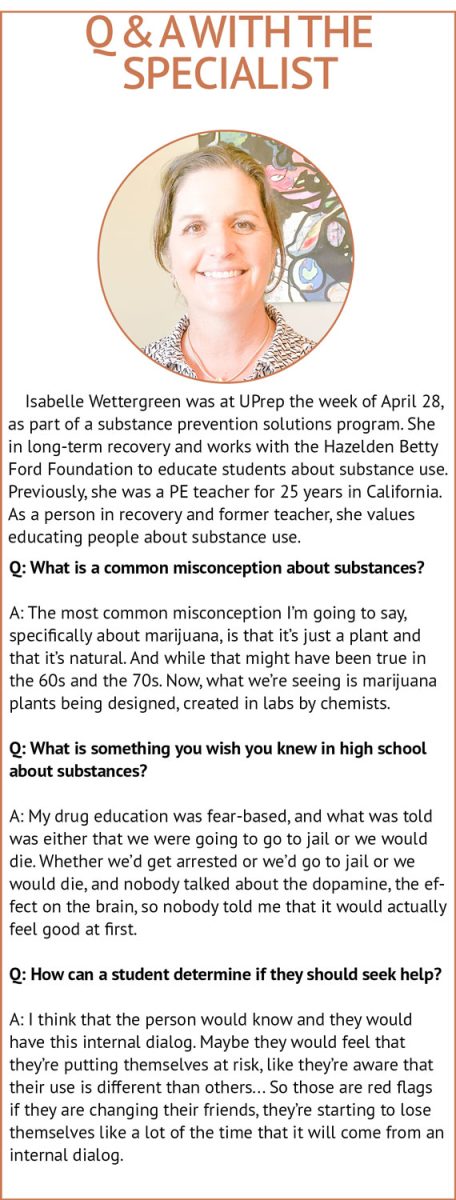
According to Jacob, substance use among students is calculated.
“I think of people outside of UPrep who have problems, they’re much less likely to succeed,” Jacob said. “But kids at UPrep still have such a strong focus on their academics and their extracurriculars that it’s hard to make it a problem.”
Notwithstanding, motivation and a strong desire to succeed in school and extracurriculars can, according to Ferguson, make people more vulnerable to experimenting with drugs.
“If you have somebody always feeling like they’re under pressure to be a high achiever, to do really well in school, to engage in all these other activities,” Ferguson said. “If for them, that stress becomes kind of too much, then they could start to turn to drugs or alcohol as a way to try to escape that feeling of being under pressure all the time.”
Ferguson notes that when students turn to substances to cope with stress, the effects can become detrimental and ultimatelycounterproductive to their success.
“Over time, their stress will become greater, or they’ll not want to engage,” Ferguson said. “They might be able to use the drug originally or initially as a way to study better or study more, or do more activities, and then over time, it’s not effective at helping them anymore.”
Director of Wellness Mark Fadool identifies stress as a major factor in substance use at the school. He aims to raise awareness of this.
“I would love for us to make sure that middle schoolers are able to have the vocabulary, the skills they need to deal with these issues,” Fadool said. “So by the time they get to be a junior senior, they already have a pretty firm foundation.”
According to Ferguson, students use substances for a variety of reasons.
“It is the cultural thing, that feeling of taboo, or something that you’re not supposed to be doing,” Ferguson said. “In our culture, you have to be 18 or 21 to be able to do these drugs. There’s a lot of being at that age where you want to experiment, where you want to do things that you’re not supposed to be doing and see what it’s all about.”
Substance use often starts in high school. The median age of first experimentation with a substance is 15, according to the think tank Urban Institute.
According to Terry and Jacob, younger students who want to obtain illicit substances tend to look to their peers to obtain them. The seniors and juniors can illegally acquire alcohol and marijuana for underclassmen through the use of counterfeit IDs, according to Terry and Jacob. Jacob stated that students providing other students with substances is generally not a for-profit endeavor.
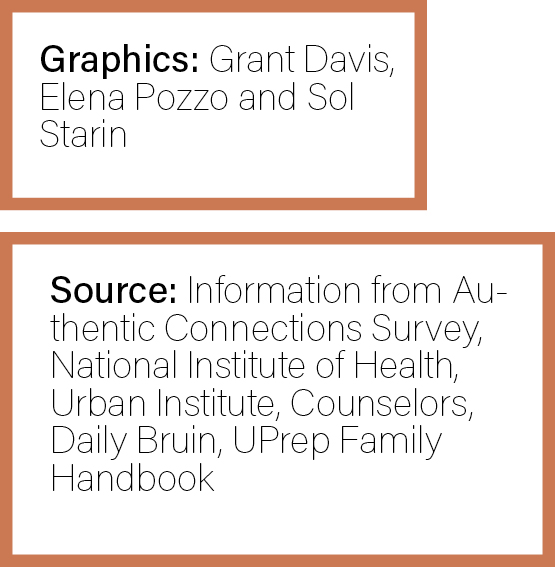
“What I think about is helping the younger generations. Like I said when I was younger, I had someone to do it for me, and they need someone to do it for them,” Jacob said. “It’s just like helping the youth type of thing.”
Student culture at UPrep generally accepts substance use, according to George.
“They try it when they’re hanging out with their friends, people go to parties, they go to functions,” he said.
The student culture at UPrep, according to Senior Leo Goldes, who opts to refrain from drinking or using drugs even when his peers do, is also accepting toward students who choose not to experiment with substances.
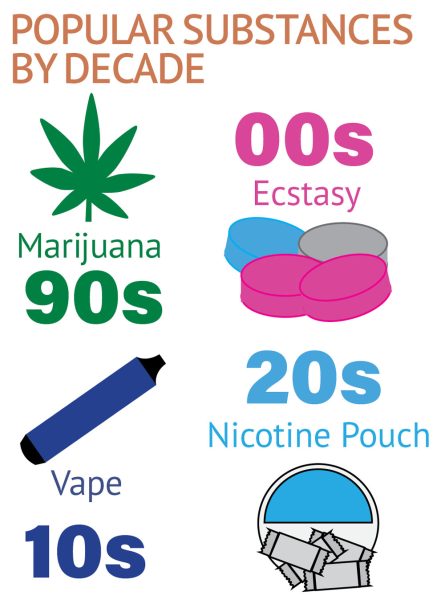
“I don’t feel that much pressure [to experiment with substances],” Goldes said.
The student culture at UPrep is also accepting toward students that do not use substances.
“I don’t really like the idea that you have to drink to have a good time, you know, hanging out, and I think it’s kind of a shame that there is that idea,” Goldes said. “You can still exist in social settings without having to drink or anything like that.”
“There can be a pressure to try and experiment with things,” George said. “From my experience no UPrep student has ever made me feel like I have to do drugs. People respect boundaries.”




